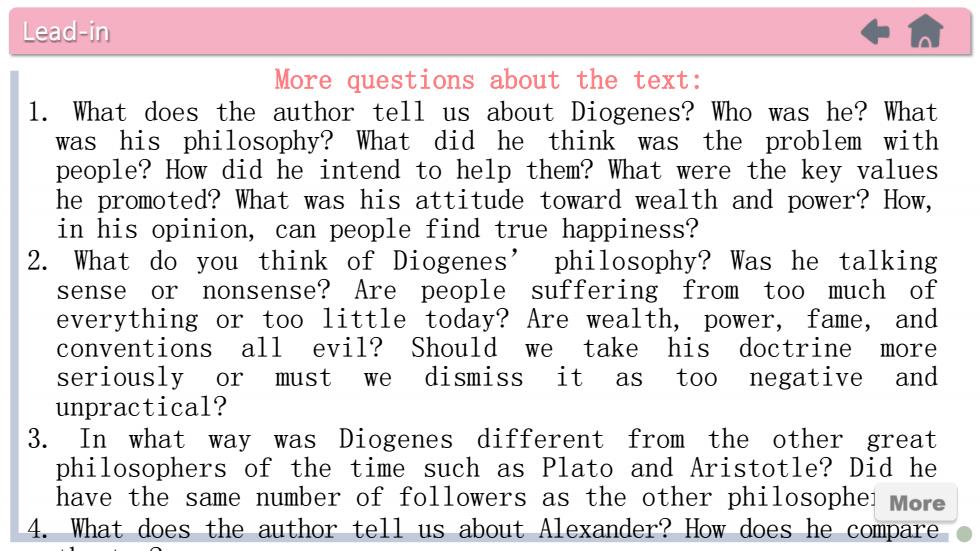
Lead-inMore questions about the text:1. What does the author tell us about Diogenes? Who was he? Whatwashis philosophy? What did he think was the problem withpeople? How did he intend to help them? What were the key valueshe promoted? what was his attitude toward wealth and power? How,in his opinion, can people find true happiness?2. What do you think of Diogenes' philosophy? Was he talkingsense or nonsense? Are people suffering from too much ofeverything or too little today? Are wealth, power, fame, andconventions allevil? Should wetake his doctrinemoredismissit asandseriouslyorwetoonegativemustunpractical?3. In what way was Diogenes different from the other greatphilosophers of the time such as Plato and Aristotle? Did hehave the same number of followers as the other philosophe More4.What does the author tell us about Alexander? How does he compare
Lead-in More questions about the text: 1. What does the author tell us about Diogenes? Who was he? What was his philosophy? What did he think was the problem with people? How did he intend to help them? What were the key values he promoted? What was his attitude toward wealth and power? How, in his opinion, can people find true happiness? 2. What do you think of Diogenes’ philosophy? Was he talking sense or nonsense? Are people suffering from too much of everything or too little today? Are wealth, power, fame, and conventions all evil? Should we take his doctrine more seriously or must we dismiss it as too negative and unpractical? 3. In what way was Diogenes different from the other great philosophers of the time such as Plato and Aristotle? Did he have the same number of followers as the other philosophers? 4. What does the author tell us about Alexander? How does he compare the two?
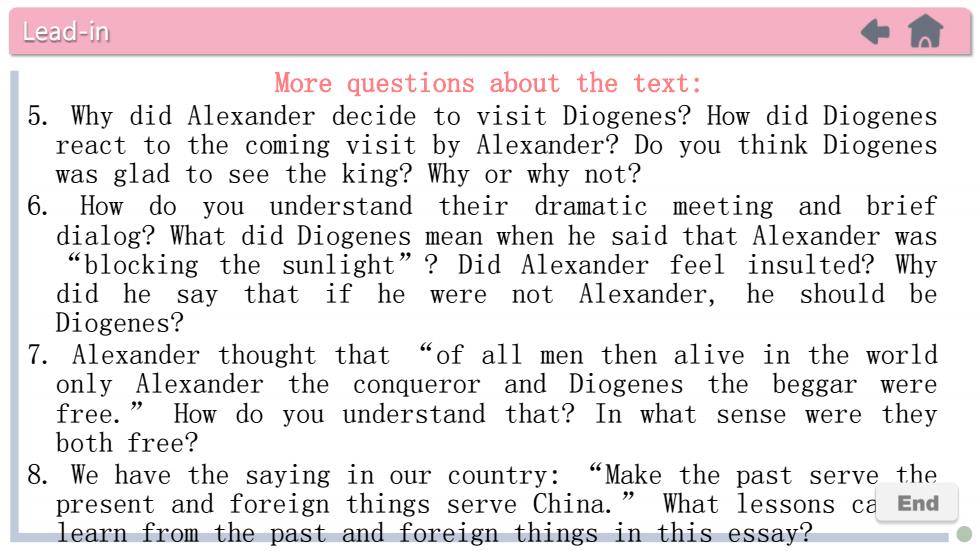
Lead-inMore questions about the text:5. Why did Alexander decide to visit Diogenes? How did Diogenesreact to the coming visit by Alexander? Do you think Diogeneswas glad to see the king? Why or why not?6. How do you understand their dramatic meeting and briefdialog? What did Diogenes mean when he said that Alexander was“blocking the sunlight”? Did Alexander feel insulted? Whydid he saythat ifhe werenotAlexander,heshouldbeDiogenes?7. Alexander thought that “of all men then alive in the worldonly Alexander the conqueror and Diogenes the beggar werefree."How do you understand that? In what sense were theyboth free?8. We have the saying in our country:“Make the past serve thepresent and foreign things serve China.” What iessons caEndlearnfromthepast andforeign thingsinthisessay?
Lead-in More questions about the text: 5. Why did Alexander decide to visit Diogenes? How did Diogenes react to the coming visit by Alexander? Do you think Diogenes was glad to see the king? Why or why not? 6. How do you understand their dramatic meeting and brief dialog? What did Diogenes mean when he said that Alexander was “blocking the sunlight”? Did Alexander feel insulted? Why did he say that if he were not Alexander, he should be Diogenes? 7. Alexander thought that “of all men then alive in the world only Alexander the conqueror and Diogenes the beggar were free.” How do you understand that? In what sense were they both free? 8. We have the saying in our country: “Make the past serve the present and foreign things serve China.” What lessons can we learn from the past and foreign things in this essay?
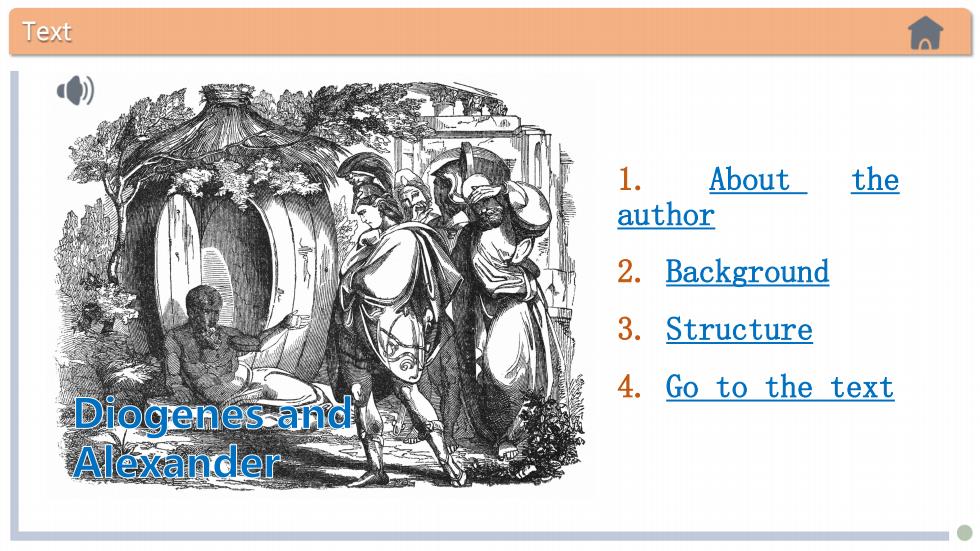
食Text1.Abouttheauthor2.Background3.Structure4Go to the textDiogenes andAlexander
Text 1. About the author 2. Background 3. Structure 4. Go to the text Diogenes and Alexander Gilbert Highet
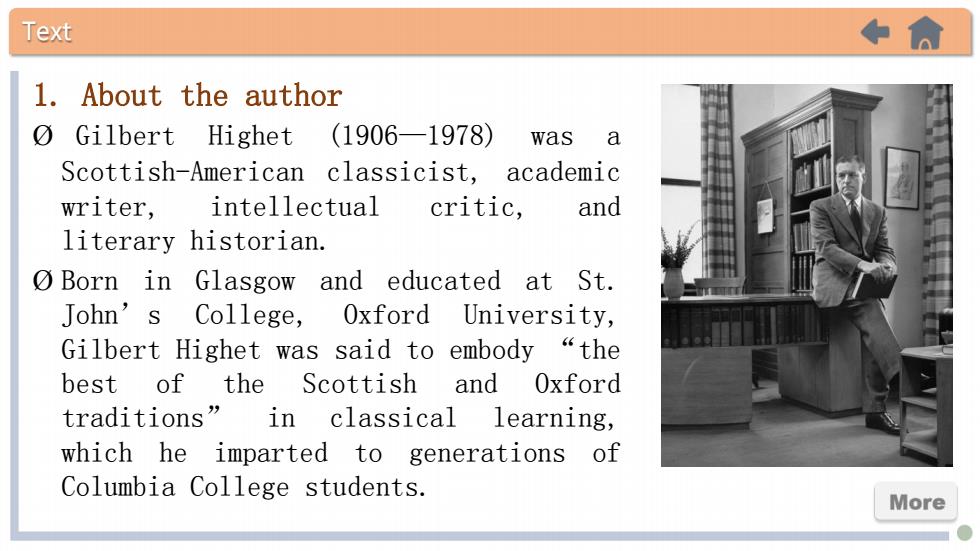
Text合合1. About the author0 Gi1bert Highet (1906—1978)awasScottish-American classicist, academiccritic,andwriter,intellectualliterary historian.OBorn in Glasgow and educated at St.John' s College,Oxford University,Gilbert Highet was said to embody“thebestoftheScottishandOxfordtraditions"inclassical learning,which he imparted to generations ofColumbia College students.More
Text 1. About the author Ø Gilbert Highet (1906—1978) was a Scottish-American classicist, academic writer, intellectual critic, and literary historian. Ø Born in Glasgow and educated at St. John’s College, Oxford University, Gilbert Highet was said to embody “the best of the Scottish and Oxford traditions” in classical learning, which he imparted to generations of Columbia College students
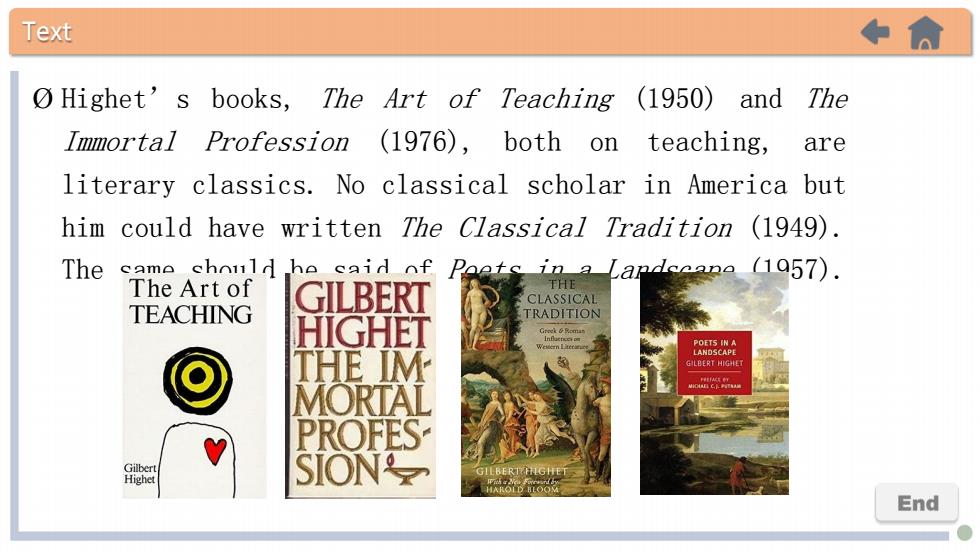
个合TextOHighet' s books, The Art of Teaching (1950) and TheImmortal Profession(1976),bothonteaching,areliterary classics. No classical scholar in America buthim could have written The Classical Tradition (1949).00(1957)The same should he said of PoetsandThe ArtofGILBERTCLASSICALTEACHINGTRADITIONHIGHETPOETSINALANDSCAPETHE IMGILBERTHIGHETMOALCEPTNAMMORTALPROFESSIONGilbertHighetEnd
Ø Highet’s books, The Art of Teaching (1950) and The Immortal Profession (1976), both on teaching, are literary classics. No classical scholar in America but him could have written The Classical Tradition (1949). The same should be said of Poets in a Landscape (1957). Text